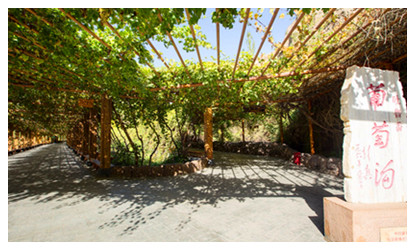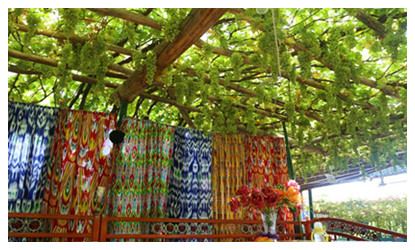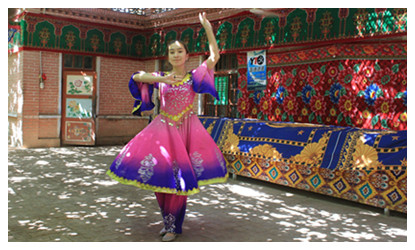Skype: neodalle-travel
Tel: +86 135 7447 2266
E-mail: sales@zhangjiajieholiday.com
What to see?
 Escaping from the fiery Flaming Mountain, one may take a seat under the grape trellis, savor various grapes, appreciate the beautiful Uyghur girls in their ornate costumes, and be fully intoxicated by this refreshing palace of grapes.Here lists five major sites in the valley.
Escaping from the fiery Flaming Mountain, one may take a seat under the grape trellis, savor various grapes, appreciate the beautiful Uyghur girls in their ornate costumes, and be fully intoxicated by this refreshing palace of grapes.Here lists five major sites in the valley.
Pleasantly cool : Being one of the valleys on the west side of the Flaming Mountain, it has totally different scenery from the Flaming Mountain. It is burning hot at Flaming Mountain, but pleasantly cool in this green Grape Valley. The water in the valley is melting snow water from Tianshan Mountains and it makes the valley lively. Wandering around, visitors can also find the drying rooms, where the sweet raisins are produced.
Famous for grapes and fruits: In the Grape Valley, there are about 13 varieties of grapes such as Manaizi (mare nipple grape), Wuhebai (white seedless grape) and so on are cultivated. Every year over 300 tons of raisins are made here. Every single grape is crystal and juicy - some are as green as emerald; some as red as agate, some as small as pearls while others are like olives. Among all these grapes, Wuhebai is reputed as a ‘bright pearl’ with the sugar content as much as 20% to 24%. Containing sugar about 60%, the raisin made of the Wuhebai, is tasty and the treasure of Turpan. Besides the grapes, fruits such as peach, apricot, apple, and pomegranate are also planted.
 The Grape Manor The Grape Manor, covering an area of 42 acres (170,000 square meters), is the first sightseeing place after entering the valley. Travelers can choose to see local sights such as the apricot garden and Apandi’s residence, or see some shows like cock-fighting, or pick up and taste the fruits while walking under the thousands meters long grape corridor.
The Grape Manor The Grape Manor, covering an area of 42 acres (170,000 square meters), is the first sightseeing place after entering the valley. Travelers can choose to see local sights such as the apricot garden and Apandi’s residence, or see some shows like cock-fighting, or pick up and taste the fruits while walking under the thousands meters long grape corridor.
Amusement Park: The last interesting place is the amusement park, in which people can drink the sweet water from Qianlei Spring (Tear Spring) and taste the local wine. It is said that men will become braver and more considerate and women become more beautiful and gentle after drinking the water from the Qianlei Spring.
Wang Luobin Art Museum: Wang Luobin is a famous Chinese songwriter, who devoted his whole life creating ethnic minority themed songs. In the museum, visitors can get a comprehensive idea about this famous composer and his popular songs.
 Folk-Custom Park of Darwaz: In the Folk-Custom Park, visitors can enjoy the high-wire walking show and taste 'Naan' (a kind of baked flatbread) baked by the world largest 'Naan Stove'. The 26-feet high stove can hold two oxen, ten sheep and one camel at the same time. Try visiting Grape Festival in August, because during the festival, one can enjoy the delicious food baked by this stove.
Folk-Custom Park of Darwaz: In the Folk-Custom Park, visitors can enjoy the high-wire walking show and taste 'Naan' (a kind of baked flatbread) baked by the world largest 'Naan Stove'. The 26-feet high stove can hold two oxen, ten sheep and one camel at the same time. Try visiting Grape Festival in August, because during the festival, one can enjoy the delicious food baked by this stove.
Home of Apandi: The Home of Apandi is not only a place for knowing the stories of Apandi, but also for knowing how ancient Turpan people lived. In local culture, Apandi (a figure in the Islamic legends), recorded as born in 1208, helped the local people fight for justice and rights, so he was the embodiment of diligence and wisdom. Day-to-day items from theTang Dynasty (618 - 906) to the Qing Dynasty (1644 - 1911) were also collected here, from which visitors can understand how local agriculture and handicraft industry developed.
Travel Tips
Add: 11 km to the northeast of Turpan City, norhwest China's Xinjiang.
Entance Fee: CNY 75
Opening Hours: 08:00-20:00
How to get there: The local public bus line 5 reaches the entrance of the valley. If starting from Turpan Railway Station, you can walk to the nearby Daheyan Bus Station to take direct buses toTurpan City. The bus departs once fully occupied starting from 05:30. Duration is around one hour and the fare is around CNY 11. After reaching city center, one can take a taxi to the valley at a cost of CNY 15 to 20.
When to visit : From April, the grapes begin to ripen, and August is the best time for tasting different kinds of fruits.
 Ask Questions ?
Ask Questions ?